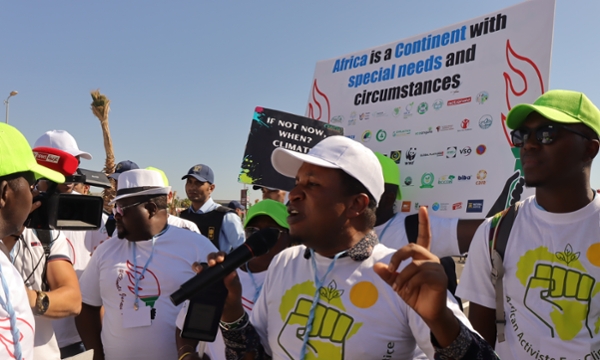
COP27 sessions in Sharm el Sheikh, Egypt.
By Clifford Akumu | akumu.clifford@gmail.com
African civil society organisations (CSOs) have expressed disappointment with the progress and expected outcomes from COP27 as the curtains closed on the global climate change meet in Sharma El Sheikh, Egypt.
The CSOs said contrary to expectations by Africa, COP27 left “millions of Africans in continued climate-related misery”.
Dr Mithika Mwenda, the Executive Director, Pan-African Climate Justice Alliance (PACJA), said Africans leave COP27 a disappointed lot.
“We came with the hope that the momentum created by the discussions in the year ahead of COP27 under the facilitation of UNFCCC, the COP Presidency and friends of the COP would materialise with concrete outcomes in Egypt. But unfortunately, the end of COP is an anti-climax,” said Dr Mwenda.
He said people facing starvation in the Eastern and Horn of Africa because of climate-related droughts, women in Nigeria drowning in floods and those buttered by the cyclones in Southern Africa would continue to wait for signals on action from the international community.
“This will continue to delay because decisions on loss and damage have been delayed yet again to 2024,” he said.
Tracy Sony, a gender specialist from Botswana, said the most pressing issue of concern is the lack of clear linkages between yearly plans, programmes and discussions from across continents but without concrete outcomes at every other COP.
“Why should we be meeting every year in these COPs that end up with no substantial outcomes?” Sony posed.
Augustine Njamnshi, Chair of Political and Technical Committee at PACJA, said Africans left COP27 less reassured of the goodwill of global leaders, especially those in high-polluting industrialised countries. He said climate activists expected to see delegations from the developed countries make bold decisions reflecting the scale and urgency of the climate crisis.
Njamnshi said that as in Glasgow last year, which lowered the bar and deferred urgent actions despite the high risk of missing the Paris Agreement targets, COP27 has dashed the hopes of the African people, potentially raising their plight.
Mentioning areas Africans felt let down by the COP27, he said failure to admit Africa’s special needs and circumstances on the agenda of COP27 contributed to the slow progress, delays and, in some cases, the lowering of ambition on issues pertinent to Africa.
In addition, the deferral of a decision on financing loss and damage to 2024 with no guarantees of an outcome that reflects the aspirations and hopes of Africa and the lower-than-needed emission reduction ambition announced by big polluters, particularly the EU, have downgraded the COP in the eyes of Africans.
Njamnshi said the lack of a clear trajectory for phasing out fossil fuels, which has resulted in the decision by some countries to continue using the high-polluting sources of energy that have powered the same economic model behind the current climate crisis, would not be helpful.
“After a careful examination of what needs to change to rekindle hope and justify Africa’s continued engagement with the global effort to address the climate crisis, we call on African leaders to reassess the relevance of the UNFCCC and COP processes to the African people and take radical actions to strengthen Africa’s voice and participation,” he said.
He demanded of big polluters to honour their engagement to deliver the resources needed to address the climate crisis in Africa, especially as it concerns adaptation and loss and damage.
Florence Kasule, a climate activist from Uganda, said African women feel disappointed by the process and progress at this COP.
“The COP was tagged as an implementation COP with its promise on key African issues and had women excited since they are the major implementers of climate action at the grassroots,” she said.
However, she added, women feel disappointed by the lack of action on adaptation, loss and damage, which has meant little action on agriculture on which the economies of African countries rely and given that women drive the venture.
Lucky Abeng, a young man from Nigeria, said the youth that make up 70 per cent of the population of the continent left COP27 disappointed.
“Young people have been disadvantaged and look to next year with uncertainty. The COP27 progress has done nothing but punctured the pride of the African youth,” he said.







